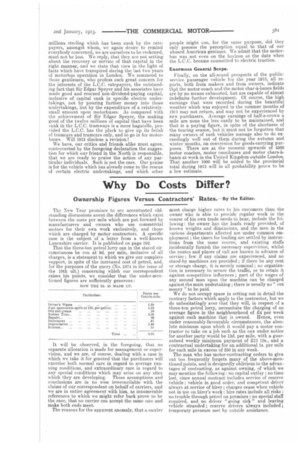Why Do Costs Differ?
Page 5

If you've noticed an error in this article please click here to report it so we can fix it.
Ownership Figures Versus Contractors' Rates. By the Editor.
The New Year promises to see accentuated oldstanding discussions anent the differences which exist between the costs per mile which are put forward by manufacturers and owners who use commercial motors for their own work exclusively, and those which are charged by motor contractors. A specific case is the subject of a letter from a well-known Lancashire carrier. It. is published on page 392.
That the three-ton petrol lorry can in the stated circumstances be run at 9d. per mile, inclusive of all charges, is a statement to which we give our complete support, in spite of the increased cost of petrol, and for the purposes of the query (No. 2074 in the issue of the 19th ult.) concerning which our correspondent raises his points, we consider that the under-mentioned figures are sufficiently generous :
It will be observed, in the foregoing, that no separate allocation is made for management or isupervision, and we are, of course, dealing with a case in which we take it for granted that the purchasers will exercise both normal care in regard to average running conditions, and extraordinary care in regard to any special conditions which may arise on any sites which they are developing. Those assumptions and conclusions are in no wise irreconcilable with the claims of our correspondent on behalf of carriers, and we are in entire agreement with him, as innumerable references to which we might refer back prove to be the ease, that no carrier can accept the same rate and make both ends meet.
The reasons for the apparent anomaly, that a carrier must charge higher rates to his customers than the owner who is able to provide regular work in the course of his own trade needs to bear, include the following: the owner has the loads ready provided, of known weights and dimensions, and the men in the various departments affected are under common employment; the times for loading are settled by instructions from the same source, and existing staffs incidentally furnish the necessary supervision, whilst the routes and places of call are known in advance of service; few if any claims are experienced, and no stand-by machines are provided ; if there be any rent or storage charge, it is merely nominal ; no organization is necessary to secure the traffic, or to retain it against competitive influences ; part. of the wages of any second man upon the machine can be charged against the main undertaking ; there is usually no" out money "to be paid. We do not occupy space in setting out in detail the contrary factors which apply to the contractor, but we do unhesitatingly aver that they will, in respect of a three-ton petrol lorry, necessitate the charging of an average figure in. the neighbourhood of 24 per week against each machine that is owned. Hence, even under reasonably-favourable circumstances, the absolute minimum upon which it would pay a motor contractor to take on a job such as the one under notice for another party would be lad. per mile, with a guaranteed weekly minimum payment of £13 10s., and a contractual undertaking for an additional is. per mile for each mile in excess of 250 in any week.
The man who has motor-contracting orders to give out too frequently forgets many of the above-mentioned points, and is designedly oblivious to the advantages of contracting, as against owning, of which we may mention the following : no capital outlay : no time lost, since annual contract includes service of reserve vehicle ; vehicle in good order, and competent driver always at service of hirer ; charges cease when vehicle not in use on hirer's work ; hire rates include all risks ; no trouble through petrol on premises ; no special staff required, and no driver " going sick" and leaving vehicle stranded ; reserve drivers always included ; temporary pressure metby outside assistance.






















